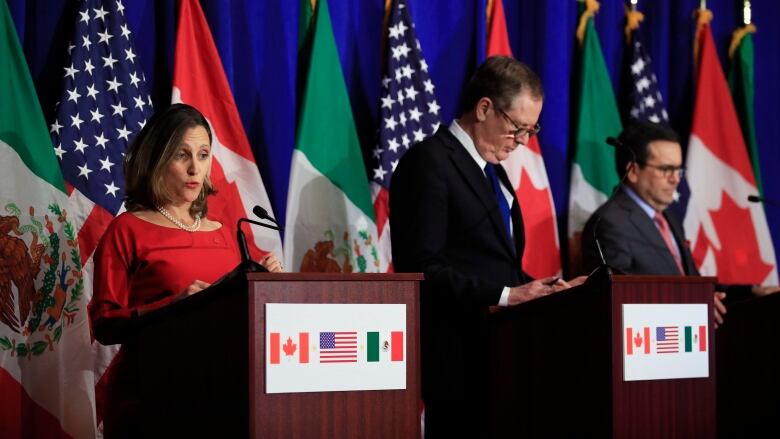Freeland calls U.S. NAFTA demands 'troubling' and 'unconventional'
Canada, U.S. trade public barbs as tense round 4 of NAFTA talks concludes

Foreign Affairs Minister Chrystia Freelandaccused the United Statesof deliberately trying to undermine the North American Free Trade Agreement, calling its list of unconventional proposals "troubling."
Her remarks came during a tensejoint news conference as the fourth round of NAFTA talks wrapped up in Arlington, Va., a suburb of Washington, D.C. As Freeland delivered therebuke of the U.S. approach, her counterpart U.S. Trade Representative Robert Lighthizersilently looked down.
Freelandsaid the "unconventional" demands from the U.S. are making the work of negotiating the trilateral trade pact"much more challenging." Shestressed that NAFTAhas created jobs and opportunities forCanada, Mexico and the U.S. for the last 23 years that have benefited middle-class families.
"Yet in rounds three and four, we have seen proposals that turn back the clock on 23 years of predictability, openness and collaboration under NAFTA," she said. "In some cases, these proposals run counter to World Trade Organizationrules. This is troubling."
Freeland said the U.S. demands on national content rules would "severely disrupt" supply chains, weakening North American productivity and jeopardizing thousands of jobs in all three countries.
She also warned that an updated NAFTA can't be achieved with a "winner-takes-all mindset," or one that tries to undermine, rather than modernize, the agreement.
Trump's trade objectives not met
Lighthizeroffered adisapproving rebuttal, accusing histradepartners of refusing to budge on proposals that would help meet President Donald Trump's objectives of addressing the "huge" trade deficit and returning manufacturing jobs to the U.S.
"Frankly, I am surprised and disappointed by the resistance to change from our negotiating partners on both fronts," he said.
"I understand that after many years of one-sided benefits, their companies have been reliant on special preferences and not just comparative advantage."
Lighthizer said he had expected further progress to date, including clearance on issues related to digital trade, telecommunications and anti-corruption.
Mexican Secretary of EconomyIldefonsoGuajardoVillarreal urged all three countries to take a constructive approach to talks to avoid a "lose-lose-lose" scenario.
"None of us want to end this process empty-handed, and there is no reason for that," he said.
A reason for optimism
During a news conference at Canada's embassy in Washington following the joint statements, Freelandsaid the fact all parties have agreed to take more time between talks and to extend negotiations into next year is a positive sign of good will among all partners.
She said Canada's approach will be to hope and work for the best outcome, but be realistic and prepared for the alternative.
"We need to be prepared in a very sensible, pragmatic, dare I say it, a no-fuss Canadian way, for the worst possible outcome," she said. "And we certainly are."
Sources close to the Mexican delegation, speaking to CBC News on background, said Mexico has no intention of walking away from the talks unless the U.S. formally triggers a suspension.
Despite the public bickering Tuesday, the sources said Mexico does not believe the talks are on the brink, and like Canada, it believes more breathing time between rounds and an extension into 2018 will be constructive to the negotiations.
However, the closer talks get to next year's Mexican elections, the harder it will be for the country to make any concessions.
One bit of leverage Mexico holds in the negotiations is the fact that, as a developing nation, it is allowed to impose higher import tariffs under World Trade Organization rules than the U.S. or Canada can if NAFTA were ripped up.
For example, if the U.S. were to hit Mexico with anti-dumping tariffs on its seasonal produce, Mexicocould retalliate against U.S. apple producers with even higher tariffs a point Mexican negotiators have been making. Mexico is the number one importer of U.S. apples.
Derek Burney,Canada's ambassador to the United Statesfrom 1989-93 who was involved with wrapping up the free-trade agreement with the U.S., wondered if the U.S. is trying to sabotage the talks.
"You have to ask yourself whether the Americans are preparing the ground for an abrogation that will be triggered by someone other than them," he told CBC News.
"So they can blame someone for the collapse other than themselves, even though it's their outlandish proposals that may trigger the demise of the negotiation."
With files from Evan Dyer and Peter Zimonjic













_(720p).jpg)


 OFFICIAL HD MUSIC VIDEO.jpg)
.jpg)



























































































